The topic of this article may not meet Wikipedia's notability guideline for biographies .(April 2011) |
Marcellus Flemming Berry was an American inventor who devised the traveller's cheque while working for American Express. [1] [2]
The topic of this article may not meet Wikipedia's notability guideline for biographies .(April 2011) |
Marcellus Flemming Berry was an American inventor who devised the traveller's cheque while working for American Express. [1] [2]

Abraham Lincoln was an American lawyer, politician, and statesman who served as the 16th president of the United States from 1861 until his assassination in 1865. Lincoln led the Union through the American Civil War to defend the nation as a constitutional union and succeeded in abolishing slavery, bolstering the federal government, and modernizing the U.S. economy.

The American Revolutionary War, also known as the Revolutionary War or American War of Independence, was the military conflict of the American Revolution in which American Patriot forces under George Washington's command defeated the British, establishing and securing the independence of the United States. Fighting began on April 19, 1775, at the Battles of Lexington and Concord. The war was formalized and intensified following passage of the Lee Resolution on July 2, 1776, which asserted that the Thirteen Colonies were "free and independent states", and the Declaration of Independence, drafted by the Committee of Five and written primarily by Thomas Jefferson, two days later, on July 4, 1776, by the Second Continental Congress in Philadelphia.

The American Civil War was a civil war in the United States. It was fought between the Union and the Confederacy, the latter formed by states that had seceded. The central cause of the war was the dispute over whether slavery would be permitted to expand into the western territories, leading to more slave states, or be prevented from doing so, which was widely believed would place slavery on a course of ultimate extinction.

Christopher Columbus was an Italian explorer and navigator from the Republic of Genoa who completed four voyages across the Atlantic Ocean sponsored by the Catholic Monarchs of Spain, opening the way for the widespread European exploration and European colonization of the Americas. His expeditions were the first known European contact with the Caribbean and Central and South America.
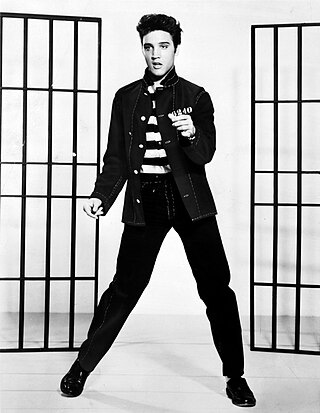
Elvis Aaron Presley, often referred to mononymously as Elvis, was an American singer, actor and sergeant in the United States Army. Dubbed the "King of Rock and Roll", he is regarded as one of the most significant cultural figures of the 20th century. His energized interpretations of songs and sexually provocative performance style, combined with a singularly potent mix of influences across color lines during a transformative era in race relations, led him to both great success and initial controversy.
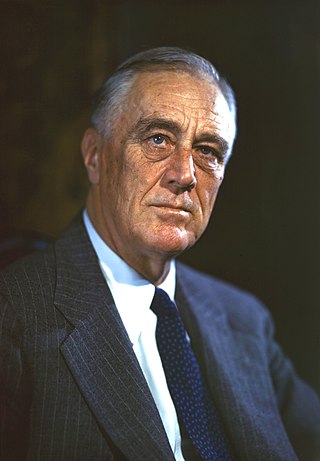
Franklin Delano Roosevelt, commonly known as FDR, was an American statesman and political leader who served as the 32nd president of the United States from 1933 until his death in 1945. A Democrat, he previously served as the 44th governor of New York from 1929 to 1933, the Assistant Secretary of the Navy from 1913 to 1920, and a member of the New York State Senate from 1911 to 1913.

George Washington was an American military officer, statesman, and Founding Father who served as the first president of the United States from 1789 to 1797. Appointed by the Continental Congress as commander of the Continental Army, Washington led Patriot forces to victory in the American Revolutionary War and served as president of the Constitutional Convention of 1787, which created and ratified the Constitution of the United States and the American federal government. Washington has been called the "Father of his Country" for his manifold leadership in the nation's founding.

James Earl Carter Jr. is an American retired politician who served as the 39th president of the United States from 1977 to 1981. A member of the Democratic Party, he served as the 76th governor of Georgia from 1971 to 1975 and as a Georgia state senator from 1963 to 1967.

Martin Luther King Jr. was an American Baptist minister and activist who was one of the most prominent leaders in the civil rights movement from 1955 until his assassination in 1968. A Black church leader and a son of early civil rights activist and minister Martin Luther King Sr., King advanced civil rights for people of color in the United States through nonviolence and civil disobedience. Inspired by his Christian beliefs and the nonviolent activism of Mahatma Gandhi, he led targeted, nonviolent resistance against Jim Crow laws and other forms of discrimination in the United States.
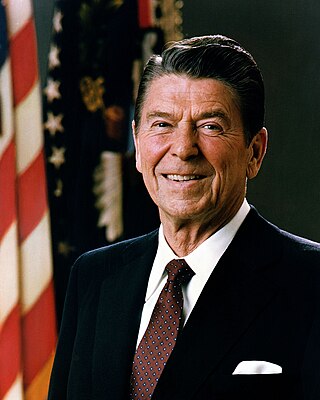
Ronald Wilson Reagan was an American politician and actor who served as the 40th president of the United States from 1981 to 1989. He previously served as the 33rd governor of California from 1967 to 1975 and as president of the Screen Actors Guild from 1947 to 1952 and from 1959 until 1960.

Thomas Jefferson was an American statesman, diplomat, lawyer, architect, philosopher, and Founding Father who served as the third president of the United States from 1801 to 1809. Among the Committee of Five charged by the Second Continental Congress with authoring the Declaration of Independence, Jefferson was the Declaration's primary author, writing it between June 11 and June 28, 1776, at a three-story residence at 700 Market Street in Philadelphia. Following the American Revolutionary War and prior to becoming the nation's third president in 1801, Jefferson was the first United States secretary of state under George Washington and then the nation's second vice president under John Adams.
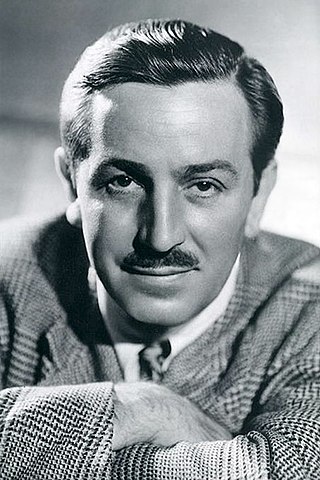
Walter Elias Disney was an American animator, film producer and entrepreneur. A pioneer of the American animation industry, he introduced several developments in the production of cartoons. As a film producer, he holds the record for most Academy Awards earned and nominations by an individual, having won 22 Oscars from 59 nominations. He was presented with two Golden Globe Special Achievement Awards and an Emmy Award, among other honors. Several of his films are included in the National Film Registry by the Library of Congress and have also been named as some of the greatest films ever by the American Film Institute. Disney was the first person to be nominated for Academy Awards in six different categories.
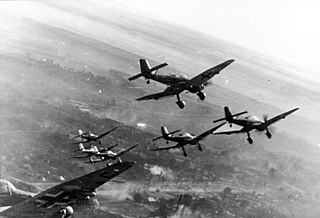
World War II or the Second World War, often abbreviated as WWII or WW2, was a global conflict that lasted from 1939 to 1945. The vast majority of the world's countries, including all of the great powers, fought as part of two opposing military alliances: the Allies and the Axis. Many participants threw their economic, industrial, and scientific capabilities behind this total war, blurring the distinction between civilian and military resources. Aircraft played a major role, enabling the strategic bombing of population centres and the delivery of the only two nuclear weapons ever used in war.

The War of 1812 was fought by the United States of America and its indigenous allies against the United Kingdom and its allies in British North America, with limited participation by Spain in Florida. It began when the United States declared war on 18 June 1812 and, although peace terms were agreed upon in the December 1814 Treaty of Ghent, did not officially end until the peace treaty was ratified by Congress on 17 February 1815.

George III was King of Great Britain and of Ireland from 25 October 1760 until his death in 1820. Both kingdoms were in a personal union under him until the Acts of Union 1800 merged them on 1 January 1801. He then became King of the United Kingdom of Great Britain and Ireland. He was concurrently Duke and Prince-elector of Brunswick-Lüneburg ("Hanover") in the Holy Roman Empire before becoming King of Hanover on 12 October 1814. He was a monarch of the House of Hanover who—unlike his two predecessors—was born in Great Britain, spoke English as his first language, and never visited Hanover.

The United States of America, commonly known as the United States or America, is a country primarily located in North America. It consists of 50 states, a federal district, five major unincorporated territories, nine Minor Outlying Islands, and 326 Indian reservations. The United States is also in free association with three Pacific Island sovereign states: the Federated States of Micronesia, the Marshall Islands, and the Republic of Palau. It is the world's third-largest country by both land and total area. It shares land borders with Canada to its north and with Mexico to its south and has maritime borders with the Bahamas, Cuba, Russia, and other nations. With a population of over 333 million, it is the most populous country in the Americas and the third most populous in the world. The national capital of the United States is Washington, D.C. and its most populous city and principal financial center is New York City.

Canada is a country in North America. Its ten provinces and three territories extend from the Atlantic Ocean to the Pacific Ocean and northward into the Arctic Ocean, making it the world's second-largest country by total area, with the world's longest coastline. Its southern and western border with the United States is the world's longest binational land border. Canada's capital is Ottawa and its three largest metropolitan areas are Toronto, Montreal, and Vancouver.
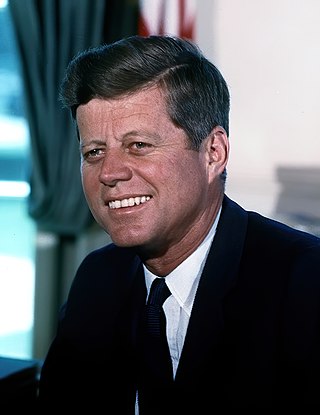
John Fitzgerald Kennedy, often referred to by his initials JFK, was an American politician who served as the 35th president of the United States from 1961 until his assassination in 1963. He was the youngest person to assume the presidency by election and the youngest president at the end of his tenure. Kennedy served at the height of the Cold War, and the majority of his foreign policy concerned relations with the Soviet Union and Cuba. A Democrat, Kennedy represented Massachusetts in both houses of the U.S. Congress prior to his presidency.

A continent is any of several large geographical regions. Continents are generally identified by convention rather than any strict criteria. A continent could be a single landmass or a part of a very large landmass, as in the case of Asia or Europe. Due to this, the number of continents varies; up to seven or as few as four geographical regions are commonly regarded as continents. Most English-speaking countries recognize seven regions as continents. In order from largest to smallest in area, these seven regions are Asia, Africa, North America, South America, Antarctica, Europe, and Australia. Different variations with fewer continents merge some of these regions, examples of this are merging North America and South America into America, Asia and Europe into Eurasia, and Africa, Asia, and Europe into Afro-Eurasia.